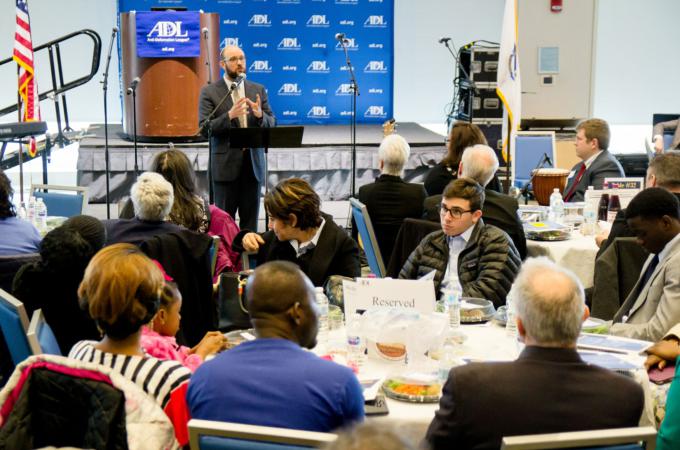ADL Seder celebrates contributions of immigrants
BOSTON -- They may not know the culture or the language. It may be very difficult for them, but nevertheless immigrants travel to the U.S. and make lives for themselves here, said Cardinal Seán P. O'Malley, addressing a crowd of hundreds gathered at UMass Boston for the 11th annual "A Nation of Immigrants" Community Seder, sponsored by the Anti-Deformation League (ADL) of New England.
Immigrants come to work for their families, he said, and they are here, today, because "they have a dream of a life of freedom, a life where their family can have education, healthcare, safety -- the same reasons that all our families came to this country."
The UMass Boston's Campus Center Ballroom, where the Seder was held, was filled with families of different faiths and nationalities. They sat at dozens of tables set with wine, matza, and the symbolic foods of the Jewish Seder, the Passover celebration that recalls the liberation of the Israelites from slavery in ancient Egypt.
For more than a decade, the ADL has hosted an annual community Seder that celebrates diversity and the many immigrants and refugees who help make up the U.S.
In a year that has seen the ending of Temporary Protected Status for immigrants of several countries and an uncertain future for Deferred Action for Childhood Arrivals (DACA) recipients, speakers at the community Seder seemed focused on highlighting the positive contribution immigrants have made in the U.S.
Cardinal O'Malley, who gave the gathering welcoming remarks, referenced President Donald Trump's proposal that the U.S. adopt a merit-based immigration program.
"It is kind of disturbing when I hear people say we should be giving preferences to ballerinas and sport stars and rocket scientists, rather than poor people," said Cardinal O'Malley. "Well, the poor immigrants that have been coming to our country for so many generations have made this a great country, and will continue to. They come, and they love this country."
Americans are "the beneficiaries of all of their gifts, all of their humanity, their talent, their hard work, their imagination they have brought to our country," he said of immigrants. "That's what we want to celebrate here today with this Seder meal."
It is fitting that immigration is the topic of the Seder meal, the cardinal continued. It was Moses who organized the first Seder, which was made to celebrate the liberation of God's people from the Pharaoh.
"Many people are coming to America as the promised land because they are trying to escape from the Pharaoh of oppression, they are hungry from violence and war," said Cardinal O'Malley. "We hope that they will find a home here, we hope that this great country will continue to honor our traditions of being a welcoming country, especially to those who are fleeing oppression and poverty."
The Seder, led by Rabbi Matthew Soffer of the Temple Israel of Boston, modeled the traditional celebration of the Passover Seder, and included readings, prayers, and songs, including a short performance by members of the Boston City Singers, a Dorchester-based organization for youth.
A joint statement signed by over a dozen Massachusetts mayors pledging to "never turn our backs on refugees and immigrants," was also read aloud during the event.
The speaking program included the personal stories of four immigrants: Jose Palma, a TPS recipient from El Salvador and a member of the Comite TPS de Massachusetts; Anthony Tucker-Bartley and Alma Onata, DACA recipients and Harvard Medical School students; and Nadia Alawa, founder and president of the humanitarian relief organization, NuDay Syria.
Addressing attendees, Palma recalled growing up in El Salvador with his three younger sisters, where "there was no hope of achieving higher education" and "no hope of finding a good paying job."
"Our lives had no future," he said, and so he came to the U.S. in 1998 for a chance at a better life. For the last 20 years, 17 of which he has had TPS, Palma said he has been "living legally and paying my taxes." Yet, he said, he has no opportunity to apply for legal status, which will leave him undocumented in September 2019, when his TPS status is set to expire after the Trump Administration refused to renew it for the 200,000 people from El Salvador allowed to live legally in the country.
"Imagine, after many years in this country, my wife and I could be arrested at any minute and deported to one of the most dangerous countries in the world," he said. The life he built here, a life that includes his three children, would be destroyed.
In his comments, Tucker-Barkley described how he originally moved to New Jersey from Jamaica at a young age. His earliest memories are from New Jersey, and it wasn't until 7th or 8th grade that he learned he was undocumented, he said.
"It was tough, it was really challenging for me," he recalled.
His family stressed the importance of education, and it was that reminder, as well as seeing his older sisters all get accepted into colleges, that pushed Tucker-Barkley to keep working hard. He graduated high school and attended Wagner College in New York, and, graduating there in 2017, is now a first-year student at Harvard Medical School.
Despite his struggles, he said he considers himself "one of the blessed ones," thanks to strong support and a caring community, things that many other DACA recipients may not have, he said. It is that thought that Tucker-Bartley said motivates him to work hard.
In closing remarks, ADL New England regional director Robert Trestan reminded attendees that the issues of immigration are both global and local, and stressed the importance of activism.
"We need to get to our elected officials, not just the ones in Massachusetts but the ones across the country. It's up to us to deliver the message," he said.



















